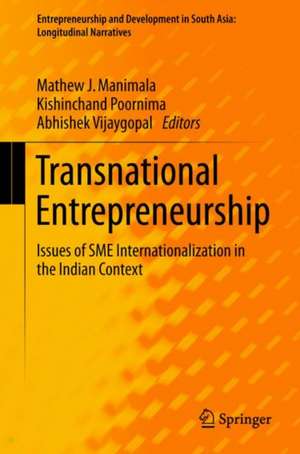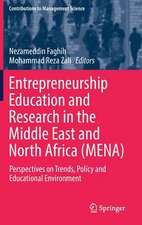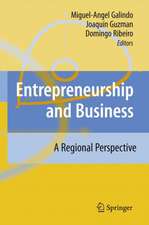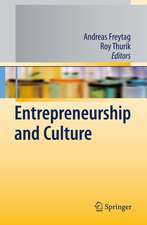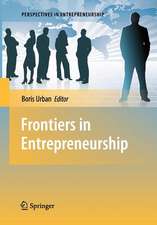Transnational Entrepreneurship: Issues of SME Internationalization in the Indian Context: Entrepreneurship and Development in South Asia: Longitudinal Narratives
Editat de Mathew J. Manimala, Kishinchand Poornima Wasdani, Abhishek Vijaygopalen Limba Engleză Hardback – 9 iul 2019
Special issues and challenges being faced by SME entrepreneurs in
emerging economies have been highlighted in this book, discussing key contemporary issues with regard to internationalization in the three dimensions outlined above. Further, the book explains how an entrepreneur can engineer the transformation of his/her organization into an international SME.This book is a very useful resource for entrepreneurs and policy-makers in general, and for academics and researchers in particular, as it provides an overview of the contemporary research in the critical areas of SME internationalization and transnational entrepreneurship by highlighting the linkages between them with special reference to emerging economies.
Preț: 1011.90 lei
Preț vechi: 1234.02 lei
-18% Nou
Puncte Express: 1518
Preț estimativ în valută:
193.65€ • 200.95$ • 161.86£
193.65€ • 200.95$ • 161.86£
Carte tipărită la comandă
Livrare economică 15-29 martie
Preluare comenzi: 021 569.72.76
Specificații
ISBN-13: 9789811062971
ISBN-10: 9811062978
Pagini: 419
Ilustrații: XIX, 419 p. 68 illus., 16 illus. in color.
Dimensiuni: 155 x 235 x 27 mm
Greutate: 0.79 kg
Ediția:1st ed. 2019
Editura: Springer Nature Singapore
Colecția Springer
Seria Entrepreneurship and Development in South Asia: Longitudinal Narratives
Locul publicării:Singapore, Singapore
ISBN-10: 9811062978
Pagini: 419
Ilustrații: XIX, 419 p. 68 illus., 16 illus. in color.
Dimensiuni: 155 x 235 x 27 mm
Greutate: 0.79 kg
Ediția:1st ed. 2019
Editura: Springer Nature Singapore
Colecția Springer
Seria Entrepreneurship and Development in South Asia: Longitudinal Narratives
Locul publicării:Singapore, Singapore
Cuprins
Part I: Introduction - Chapter 1. Internationalization of SMEs: The Role of Strategies, Resources and the Ecosystem.- Part II: Individual and Firm-level Resources for Internationalization.- Chapter 2.Internationalization of SMEs in Emerging Economies: Critical Role of Firm level Resources.- Chapter 3. Returnee Entrepreneurs (REs): A Comparison between Direct and Indirect REs on the use of Social Ties for New Venture Creation.- Chapter 4. Survival of Indian High-tech Start-ups: A Comparison between Transnational and Local Entrepreneurs.- Chapter 5. Entrepreneurs to Enterprise (E2E): Facilitating Internationalization of SMEs through Virtual Entrepreneurship.- Chapter 6. Information Asymmetry Risks in VC Investments: Strategies of Transnational VC Firms in India.- Chapter 7. Influence of Information Systems Strategic Orientation on SMEs’ Perception of Export Barriers.-Chapter 8. Strategies and Processes of Internationalization: A Case Study of the KARAM Group of Companies.- Chapter 9. Serviced Apartments Industry in India: A Study on Issues, Growth Prospects and Best Practices for Internationalization.- Chapter 10. Motives, Drivers and Barriers for Internationalization: A Study of SMEs in Andhra Pradesh.- Part III: Ecosystem for Internationalization.-Chapter 11. Institutional Voids and their Impact on Transnational Entrepreneurship: A Study of Sri Lankan Entrepreneurs.- Chapter 12. SME Performance and Access to Export Markets: The Role of Institutional Credit.- Chapter 13. Internationalization of Auto-component SMEs: A Case-based Analysis of the Role of Institutional Networks.- Chapter 14. APEC’s Impact on Internationalization: Comparison between Global Value Chain (GVC) SMEs and Born Global SMEs.- Chapter 15. Development and Internationalization of Women’s Enterprises: Benchmarking Indian Policies with OECD Policies.-Chapter 16. Ecosystem for Social Entrepreneurship in India: Facilitating Returnee Entrepreneurs.-Chapter 17. Internationalization of Incubatee SMEs: The Role of Government supported Incubators.- Part IV: Evolution and Organizational Change for Internationalization.- Chapter 18. Internationalization of SMEs: A Darwinian Perspective.- Chapter 19. Organizational Transformation of Internationalizing High-tech SMEs in India: A Case-based Analysis.- Chapter 20. Internationalization of New Technology Ventures: Organization Development for Innovation and Creativity.
Notă biografică
Mathew J. Manimala retired as Director, Xavier Institute of Management and Entrepreneurship (XIME), Bengaluru, India. Prior to joining XIME in July 2015, he was a Professor and Chairperson of the Organisational Behavior and Human Resources Management area at the Indian Institute of Management Bangalore (IIMB), where he has also served as the Jamuna Raghavan Chair Professor of Entrepreneurship, and as the chairperson of the N.S. Raghavan Centre for Entrepreneurial Learning (NSRCEL). His earlier academic positions were at the Administrative Staff College of India (ASCI) and Cochin University of Science and Technology (CUSAT). He is a recipient of the prestigious Academy of Management (AOM) Heizer Award for outstanding research in the field of new enterprise development and has published several research papers and books in the areas of Entrepreneurship and Organizational Behavior. He is a member of the editorial board of several journals and the editor of South Asian Journalof Management (SAJM).
Kishinchand Poornima Wasdani is Mitacs Post-Doctoral Fellow at the School of Business (SoB), Royal Roads University (RRU), Victoria, BC, Canada, and the Associate Editor of South Asian Journal of Management, published by the Association of Management Development Institutions in South Asia (AMDISA). She obtained her doctoral degree from the Department of Management Studies, Indian Institute of Science (IISc.), Bengaluru. Post her Ph.D., she joined Sir M. Visvesvaraya Economic Research Centre, a research initiative of the Federation of Karnataka Chambers of Commerce and Industry (FKCCI), as the Research Head. Her research interests include Entrepreneurship, New Venture Creation, Social Entrepreneurship, Small and Medium Enterprises, and Organization Behavior.
Abhishek Vijaygopal is an Academic Associate at the N. S. Raghavan Centre for Entrepreneurial Learning (NSRCEL), Indian Institute of Management Bangalore (IIMB), Bengaluru, India. He was earlier a Doctoral Research Scholar at the Department of Management Studies, Indian Institute of Science (IISc.) Bengaluru. His areas of research interest include Corporate Governance, Entrepreneurship, Micro, Small, and Medium Enterprises (MSMEs), Organization Behavior, and Solid Waste Management (SWM). He was earlier an Information Technology (IT) professional and has six years of combined experience working in both Java/J2EE and Microsoft technologies. During this period, he worked in both analytical and development roles, in the domains of Financial Services, Manufacturing, and Training.
Kishinchand Poornima Wasdani is Mitacs Post-Doctoral Fellow at the School of Business (SoB), Royal Roads University (RRU), Victoria, BC, Canada, and the Associate Editor of South Asian Journal of Management, published by the Association of Management Development Institutions in South Asia (AMDISA). She obtained her doctoral degree from the Department of Management Studies, Indian Institute of Science (IISc.), Bengaluru. Post her Ph.D., she joined Sir M. Visvesvaraya Economic Research Centre, a research initiative of the Federation of Karnataka Chambers of Commerce and Industry (FKCCI), as the Research Head. Her research interests include Entrepreneurship, New Venture Creation, Social Entrepreneurship, Small and Medium Enterprises, and Organization Behavior.
Abhishek Vijaygopal is an Academic Associate at the N. S. Raghavan Centre for Entrepreneurial Learning (NSRCEL), Indian Institute of Management Bangalore (IIMB), Bengaluru, India. He was earlier a Doctoral Research Scholar at the Department of Management Studies, Indian Institute of Science (IISc.) Bengaluru. His areas of research interest include Corporate Governance, Entrepreneurship, Micro, Small, and Medium Enterprises (MSMEs), Organization Behavior, and Solid Waste Management (SWM). He was earlier an Information Technology (IT) professional and has six years of combined experience working in both Java/J2EE and Microsoft technologies. During this period, he worked in both analytical and development roles, in the domains of Financial Services, Manufacturing, and Training.
Textul de pe ultima copertă
This edited volume develops an understanding of the strategies, processes, issues and concerns involved when small and medium-sized enterprises (SMEs) go international with their local products/services and vice versa. It is a compendium of eighteen selected chapters on the subject, supported by an introductory chapter. The contributions are organized in four parts based on the sub-themes they deal with. The first part, containing the introductory chapter, provides different perspectives on transnational entrepreneurship, returnee entrepreneurship and their linkages with the internationalization process. The subsequent parts have chapters dealing with three sub-themes of the subject – the internal factors (individual and firm-level resources), the external factors (entrepreneurial ecosystem), and the process of organizational transformation and change, respectively, in the context of SME internationalization.
Special issues and challenges being faced by SME entrepreneurs in emergingeconomies have been highlighted in this book, discussing key contemporary issues with regard to internationalization in the three dimensions outlined above. Further, the book explains how an entrepreneur can engineer the transformation of his/her organization into an international SME.
This book is a very useful resource for entrepreneurs and policy-makers in general, and for academics and researchers in particular, as it provides an overview of the contemporary research in the critical areas of SME internationalization and transnational entrepreneurship by highlighting the linkages between them with special reference to emerging economies.
This book is a very useful resource for entrepreneurs and policy-makers in general, and for academics and researchers in particular, as it provides an overview of the contemporary research in the critical areas of SME internationalization and transnational entrepreneurship by highlighting the linkages between them with special reference to emerging economies.
Caracteristici
Provides a concise overview of barriers to and facilitation of SME internationalization in emerging economies, and how this internationalization is influenced by both individual and firm-level resources Discusses contemporary issues in the nascent field of Transnational Entrepreneurship, especially in the South Asian context, and outlines newer perspectives about the role of organizational transformation in internationalization of SMEs Highlights the role of the different facets of the entrepreneurial ecosystem in enabling internationalization of SMEs and development of transnational enterprises
